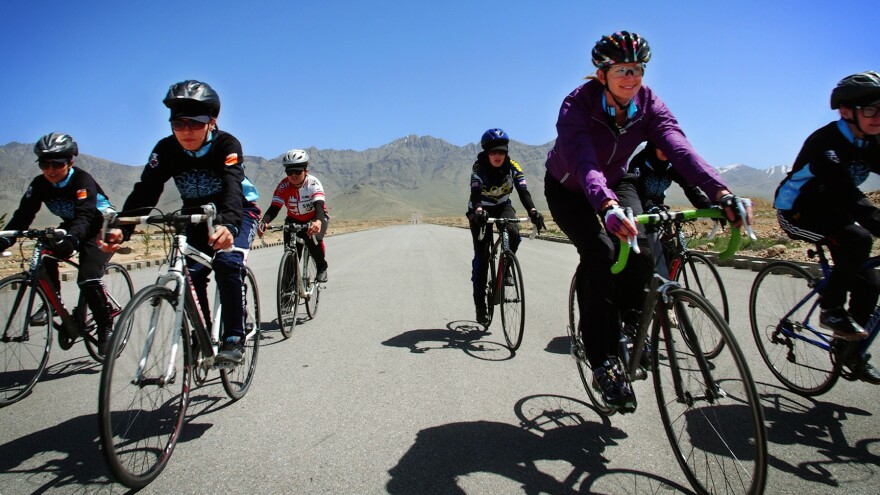On a recent day, just west of Kabul — where the city's sooty sky gives way to fresher air — Abdul Sadiq coaches four young members of the Afghan National Cycling Federation. They're working on their riding technique while dodging the free-form traffic.
"The road is very narrow. Make sure you don't get into an accident, as you can see the cars are coming," the former competitive cyclist tells them, amid zooming vehicles and honking horns.
They're at Qargha Lake, whose aquamarine waters sit below a snow-sprinkled mountain backdrop of 13,000-foot peaks. It was here in 2012 that Taliban insurgents attacked a resort, killing 18 Afghans.
But this day is all about riding: The cyclists wear long-sleeve jerseys and full-length tights — and draw hoots, honks and open-mouth stares when they pedal past.
These aren't ordinary riders: They're members of Afghanistan's only women's cycling team. And in this deeply conservative country where women have long been confined to the shadows, they face more dangerous obstacles than chaotic roads.

Sadiq, who also founded the national men's cycling team, says he was inspired to form a women's club a few years ago after his daughter expressed interest in learning to ride.
"After my daughter started cycling, the neighborhood girls became interested in cycling, and then the Afghan media did a report on us, and all of a sudden we had a flood of women," he recalls.
Sadiq is wearing a decidedly nontraditional coach outfit consisting of a black corduroy suit and the sharp black shoes Afghan men favor. He says about 100 young women are now involved in cycling in Afghanistan, including 10 or so skilled enough to compete. They were in Pakistan in early April for a race. Soon they'll travel to Kazakhstan for the Asian Cycling Championships.
Despite the team's growing expertise, there is still a ways to go to find acceptance at home.
Coach Sadiq says they try to turn a deaf ear to criticism that Muslim women shouldn't be out riding bicycles. He says his riders have been hit by stones and shot at with slingshots. Assistant coach and lead rider Marjan Sadeqi had a terrifying experience while training last year. She was rammed by a guy on a motorbike and knocked unconscious.
"It was a terrible thing because I was really hurt in my back. I was basically knocked out," Sadeqi says. "I was [injured] for a whole month — five days in hospital and the rest of it at home."
But she wasn't about to give up on her new sport.
"I'm not the kind of woman to be scared. When I make up my mind to do something I'll do it," she says. "So once I recovered I got back on my bike, and here I am cycling again."

Sadeqi is on the short side with a steely disposition. She's decked out in wraparound sunglasses and a yellow and black jersey. Her concession to Muslim modesty on this cool spring day is the baseball cap she wears under her helmet to keep her hair in check. Of course, even on the hottest days she's still obliged to cover up in full-length workout togs.
Not too long ago, Sadeqi and her teammates had to crank along on old steel-framed clunkers with kickstands. But today they're riding smooth-shifting carbon-fiber racing bikes thanks to the nonprofit group Mountain 2 Mountain, which has been supplying these women with high-tech gear for the past two years.
Whatever the equipment, Sadeqi is the linchpin. The 25-year-old cyclist grew up in Iran. She says her parents don't even know she's a racer. But her husband supports her career. He's open-minded, she says. And she hopes women's cycling can help make Afghan society more open-minded, too.
"Of course it has helped. ... We are riding in front of all these men and I'm sure some of them, their minds have opened up," she says. "I just want to introduce to the world the women of Afghanistan, that they are able to do anything any other women are able to do."
As the training day ends, the young women say their goodbyes and pile their bikes into the back of an old van with some blankets to pad the clanking frames. Someday they hope to have a proper transport vehicle, complete with bicycle rack.
Copyright 2021 NPR. To see more, visit https://www.npr.org. 9(MDIxMDkyNjUxMDE0NDY1Njg1NzRiOTRiYQ000))





